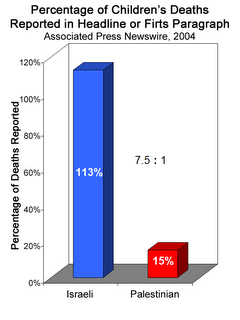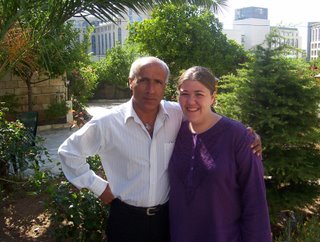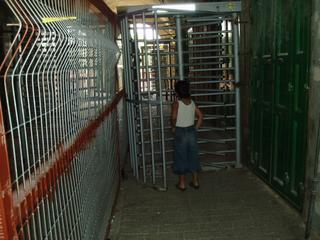Meeting Needs: Musings on Nonviolence
While I was in Palestine I made a strange discovery: it is relatively easy to stand, unarmed, in front of angry soldiers. Really, it is. Let me explain.
Soon after I arrived in Palestine, I stopped at a checkpoint within the city of Hebron. There are seven checkpoints inside the small city of Hebron. These checkpoints sit in the street right besides Palestinian homes and Palestinians must pass through them everyday: Mothers on the way to the market, children on the way to school, families as they take their loved ones to the hospital, friends as they walk down the street to visit their neighbors.
I stopped at this checkpoint because two Palestinian young men were standing off to the side, leaning against a wall silently. Myself and members of Christian Peacemaker Teams asked the young men if they were being detained. They said "Yes, for two hours," and asked us to speak with the solider manning the checkpoint.
I remember looking down and seeing the two ID cards lying on the cement of the checkpoint. For half a moment, I wondered, "Could I just snatch them and run?" Then I looked up at the solider. "Why are you holding these boys?" we asked.
It was my friend Shelly that set the solider off. "You can't just hold these boys, unless they've done something," she said politely. "I do not give a shit about international law!" Suddenly the solider was screaming. "I do not give a shit about human rights. I am the law. I will do whatever I want!"
I hope you'll forgive me when I say that I don't remember exactly what happened next. But I do remember the solider screaming and telling us to leave the checkpoint. I was standing right in front of him. I watched as he raised his M16 and pointed it directly at me. I swear the rifle made some sort of clicking noise as he fingered the trigger.
That moment I remember vividly. It was the first time that I had a gun pointed at me and I panicked. In an instant, four thoughts galloped through my mind. First, I thought, "I didn't think that intervening at a checkpoint was such a big deal!" Then I honestly, though irrationally, thought that I was about to die. I considered diving down to the ground, like you see on TV, or running out of the checkpoint, or crying, or doing anything to keep myself alive. But equally quickly, I stood up straighter. I looked directly at the gun. "I'm not moving," I thought, "Because I am proud of what I'm doing."
Shelly told the solider not to point the gun at me, and he dropped it down to his side. For the next hour and a half, we stayed at the checkpoint as the solider continued to yell and tried to intimidate us. Eventually, the boys were released. Shelly was arrested, but allowed to leave without charges. Our lives, the lives of the soldiers and the lives of the Palestinians continued.
I was shaken by this experience, but I recovered more quickly than I expected. Soon enough, I was no longer fazed by guns, tear gas or sound bombs. I thought nonviolence was becoming easier. I later realized that I was wrong. I’m not saying that I am a brave person and I understand that my privileged status as an international and a white person allows me to travel through the West Bank without being a target. I am trying to say, however, that it is easy to become dulled to violence. And being dulled to violence, isn’t the same as practicing nonviolence.
Towards the end of my stay in Palestine, I had an experience that made me consider if I was really practicing nonviolence. I was standing in the front of a demonstration of Palestinians who are loosing their land because it is in the path of the Wall – a 25ft high cement barrier that the Israeli government is constructing across Palestinians lands. “You must leave!” an Israeli solider told me in a brisk, automatic voice. “No,” I answered, probably sounding brash and annoyed. The solider said, “This is a closed military zone. You must leave or I will arrest you in the name of the law.” The solider stepped back and tapped a plain wooden stick into his hand, like a cop. He didn’t sound angry, strangely, just prepared, well-trained. “In the name of God, I will stay right here!” I shot back at him.
An older Palestinian gentleman grabbed me then and pulled me back into the crowd. The solider lost interest and I started to think about what I had said. Something felt wrong. It was good rhetoric, I suppose. I had wanted to communicate that my faith was part of the reason that I was demonstrating with my Palestinian friends. But what a face of Christianity I had shown: frustration, annoyance, self-righteousness. Not much in the way of love.
Much of the reason that I decided to go to Palestine was that I want to learn more about the meaning of nonviolence. I wanted God to teach me how to love other people. But as God seems determined to surprise me at every moment of my life, naturally I've been learning more about nonviolence now that I'm out of the stress of the West Bank.
Now I’m back in the United States, I don’t stand in front of soldiers. Instead, I speak in front of crowds who know very little about Palestine. Most of the people I talk with are open-minded and shocked by the stories that I tell. But there are others who already have firm opinions and sometimes I feel like they fire questions up at me like soldiers fire bullets. I find myself listening to a large number of questions that seem to reflect a great deal of racism and hatred of Muslim people. It’s painful to speak about Palestine, and it’s even more painful to try to love people who say such things. Lately, I’ve felt lost. What sort of nonviolent campaign would lead to public support for an end to the occupation?
As I’ve tried to imagine what sort of a campaign would be effective, I’ve thought a lot about the example of my Palestinian friend Fatima. Fatima founded an organization called Women for Life. Actually, Fatima originally choose the name “Women Against the Wall,” and tried to organize women to take direct action against Israel’s annexation Wall. Most women, however, just weren’t willing to take that sort of action. So Fatima changed her focus. She didn’t give up Palestinian liberation for women’s liberation, but combined both. Now Women for Life works with women to meet their needs in a way that opposes the occupation. Fatima organizes income generation projects that help women to feed their families without getting a job in an Israeli-owned sewing factory. She also helps to run a girls’ group called “Flowers against the Occupation,” that helps girls become strong people, well-practiced in nonviolence. Fatima and the girls are currently organizing summer camps aimed at creating a children’s movement to boycott Israeli goods. Her projects are among the more vibrate and productive I’ve seen in Palestine. They confront the occupation while meeting the real needs of Palestinian woman. And there’s some power in that.
I’m starting to wonder if there aren’t some needs that I could meet in my anti-occupation activism. I’ve been thinking about why Americans support the occupation. Besides our government’s unholy alliance with the military industrial complex, I think there are three primary assumptions that fuel public support for Israel’s occupation:
1) We believe in the myth of “redemptive violence.” In this case, we believe that it is possible for violence to end suicide bombings and bring security for Israel.
2) We embrace a system of racism against Arab people. Many Americans fear and hate Islam.
3) Many sincere and sensible Jewish people feel afraid because of the long history of Jewish persecution, overwhelming at the hands of Christian people.
When I look at these beliefs, I see unmet needs at their roots. We need alternatives to violence. The relationships between white people and people from the Middle East need to be held. Jewish people really do need to feel safe in our communities and our world.
I tend to discount reconciliation work as overlooking the structural injustices of our world. But I’m starting to wonder if we do reconciliation work with a real political consciousness. Moreover, if anti-occupation activism doesn’t address these needs, and address them at a deep level, then how exactly are we going to convince people to oppose the occupation? I’m pretty sure more marches won’t make a difference. Movements with power are the one people want to join because the movement meets a need. That’s direct action.
I’m learning that nonviolence is more than standing in front of soldiers. It’s more than being nice when other people are mean. It’s a love that meets the real needs of real people, healing the broken relationships that cement structural injustices. It creates political change through human transformation. And at all levels, it’s disarming.
My friend Fatima gave me a rose when I left Palestine. “This is a piece of my land,” she said. I could see in her eyes how much she wanted to give me a part of the land that meant so much to her, the land that all Palestinians are losing. You know, there’s some power in that kind of generosity, that human connection. Think we could harness that power for political change?
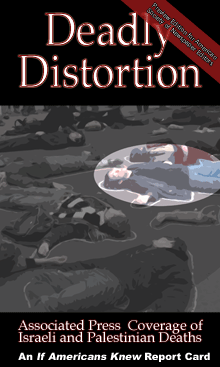 Accouncing the results of many, many hours of hard work...
Accouncing the results of many, many hours of hard work...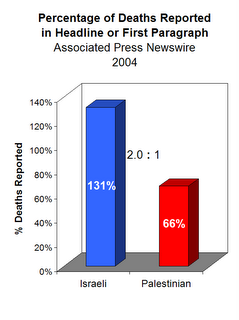 and grizzly, as it sounds. But the results were interesting...to say the least.
and grizzly, as it sounds. But the results were interesting...to say the least.
